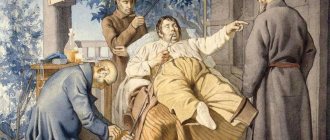History of creation
Chekhov's story was first published under the pseudonym Antoshe Chekhonte in the magazine Oskolki in 1884. This work appeared after the author read a book of complaints at one of the stations in the Donetsk region. Many of the entries in it amused him.
It is known that almost all the names in the story are fictitious, but there are also real ones. So, in one of the entries they ask to hand over the cigarette case to a certain Andrei Yegorych. It turns out that such a postmaster actually lived in the city of Voskresensk, where Anton Pavlovich himself worked.
The story “The Book of Complaints” quickly spread into quotes, among which the most popular was the last phrase: “Even though you are the seventh, you are a fool . It became winged, and other writers used it in their works:
- Ivan Bunin in the story “Inscriptions”.
- Alexander Kuprin in the story “Staff Captain Rybnikov.”
Meaning of the name
Chekhov's literary work, according to all the requirements, belongs to a humorous story . Despite the fact that the name is simple and clear, it is also bright.
When the reader picks up this book and reads the title, he immediately has ideas about the usual book of complaints that is in any store. But in the process of reading, he begins to understand that the content of Chekhov's story reveals all the comedy of the title.
It turns out that the complaint book is a cheerful collection of notes left not only by travelers, but also by local residents.
“Book of Complaints” - a reader’s diary based on a story by A. Chekhov
“The Book of Complaints” is a story by the great Russian writer Anton Pavlovich Chekhov. First published in the magazine “Oskolki” No. 10 dated March 10, 1884 under the signature “A. Chekhonte."
Description of the book for the reader's diary
Author : Chekhov Anton Pavlovich Title : Complaint book Number of pages : 2. Publisher: “Prof-Press”. Year of publication: 2006 Genre : Short story Year of writing : 1884
Time and place of the plot
The events in the story take place in the second half of the 19th century in Tsarist Russia, at one of the many nameless stations scattered throughout the country.
The main characters and their brief characteristics
Yarmonkin is a narrow-minded citizen, ready to blame anyone for his own stupidity, but not himself.
Samobeshev , a clerk, outraged by the rude behavior of the conductor and gendarme, is the only person who left feedback on the case.
Alexey Zudyev is a high school student, a seventh grade student at the Kursk gymnasium, an overly emotional boy.
A cheerful summer resident is a cheerful man, a great joker.
Deacon Dukhov is a clergyman who did not understand that he would not find Lenten food at a roadside buffet.
Kozmodemyansky is a telegraph operator who was fired for drunkenness, but he never admitted his guilt.
Ivanov the 7th is the only person who tried to reason with those who left stupid notes, and in response received an insult.
Summary and plot
At the railway station there was a complaint book, which was kept in a special locked desk. According to the rules, the keys to this office were to be kept by the stationmaster. However, in fact, it was always open, and anyone could leave their review there.
The book was full of all sorts of insults and drawings, it even contained declarations of love and complaints about things that had nothing to do with the work of the railway station. At the same time, many records were literally full of errors.
Someone drew a funny face with horns and a long nose in the book, making the inscription “You are a painting, I am a portrait, you are a beast, but I am not.”
Below it, a certain Mr. Yarmonkin complained about the wind, which tore his hat off while the train was moving.
The clerk Samobshev decided to complain about the conductor and wrote a whole petition. The rude conductor Kuchkin had the audacity to be rude to his quiet, modest wife, while the gendarme Klyatvin grabbed the clerk himself by the shoulder.
Seventh grade student Alexey Zudyev also tried to leave a note in the complaint book. But, apparently, the high school student was overcome by such strong emotions that he could not cope with them, and his complaint was completely crossed out.
Some cheerful summer resident wrote that while waiting for the train he was forced to look at the face of the station master, and he really did not like her.
Following the summer resident, someone warned that Teltsovsky is a cheater, and the gendarme’s wife is cheating on her husband with the bartender Kostya. And Deacon Dukhov was very dissatisfied that, driving past the station and being very hungry, he did not find Lenten food in the local buffet. Just below, an anonymous person rudely advised him to eat what they give.
A certain passenger lost his leather cigarette case and asked those who found it to hand it over to the ticket office. Telegraph operator Kozmodemyansky was indignant because of his dismissal, the reason for which was his drunkenness. In anger, he called everyone swindlers and thieves.
This was followed by a declaration of love, after which a certain Ivanov the 7th asked not to write extraneous things in the book of complaints. Below they answered him that, although he was the seventh, he was a fool.
Conclusion and my opinion
At first it may seem that the story is devoid of any meaning. But by analyzing each note, you can get an idea of the character, habits, and life values of the person who left it in the complaint book. In such an intricate way, the writer reflected not only the images of specific people, but also showed Russia in miniature - what people live with, what they are happy about and what they are sad about. The story makes you laugh not only at the characters in the story, but also at yourself, because among the shortcomings of others, everyone can find something relatable. The story involuntarily makes you smile, and it is with the help of laughter that A.P. Chekhov tries to fight human vices and shortcomings.
Main thought
Stupid, narrow-minded and ignorant people are the scourge of any society.
Quotes from the story text
“...Eat what they give you...”
“...Since I am being driven out of service as if I was drunk, I declare that you are all swindlers and thieves...”
“...Adorn yourself with virtue...”
“...I don’t know who wrote it, but I’m a fool at reading...”
“...Even though you’re seventh, you’re still a fool...”
Dictionary of new and unfamiliar words
A gendarme is a mounted policeman.
Sovereign is the same as master, owner, owner (also in respectful address).
Clerk - a junior employee in an office or other institution in writing.
A conductor is a railway employee who accompanies a carriage along the way.
Physiognomy – the front part of a person’s head, face.
Issues and main idea
From the summary of the story “Book of Complaints” it is clear that the first paragraph is written on behalf of the author, who talks about where this very book is located. After this there are recordings of different people who acquire funny dialogue. They are written in both the first, second and third person. But at the same time, the author is constantly present, trying to reveal the meaning of each remark.
The main theme of this literary work is to demonstrate human stupidity. By showing the characters' remarks, which look like a hooligan joke or are accusatory in nature, the author expressed the main idea of his work - the stupidity of a person can be funny. But you cannot combine anger and stupidity, as this already turns into meanness.
Despite the fact that there is no coherent plot in Chekhov's story, each remark shows a funny situation and the characters emerge. The main artistic detail is the illiteracy of the text in the book of complaints. Therefore, Anton Pavlovich raises not only the problem of insufficient education, but also shows what happens with enormous conceit and the desire to express oneself.
Artistic techniques
A brief retelling of the “Book of Complaints” allows us to note that it does not have the usual compositional structure. Chekhov's work is compositionally divided into two parts:
- Author's narration.
- Twenty entries made in the complaint book.
To create comic content, the author uses lines that are completely unsuitable for a complaint magazine. Thus, it is indicated to visitors that the book is kept in the office, and the key to the room can be asked from the gendarme. But in fact, the book is not closed anywhere and anyone can use it. Anton Chekhov in his work uses such a technique as the huge presence of grammatical and speech errors in the entries of visitors.
There is a lot in the plot of Chekhov's work that is absurd, and the author often uses such an artistic and expressive means as hyperbole. It was the exaggeration that could create a greater comic effect.
Characters
For a reading diary, students should write not only the author and title of the work, but also briefly tell the plot, as well as characterize the characters. Heroes include all the characters who make entries in books:
- Yarmonkin.
- Samobeshev.
- Zudiev.
- Summer resident.
- Deacon of Spirits.
- Kozmodemyansky.
- Ivanov the Seventh.
Chekhov used telling surnames to enhance the impression of comedy and gaiety of the situation. So, Yarmonkin is a stupid person, but he does not admit it, considering himself smart, and considers others fools. Also interesting is the deacon of Spirits, who could not understand why there was no Lenten food in the buffet.
The clerk Samobuchev leaves the only correct review in the book after he saw the rude behavior of the gendarme and the conductor. But Alexei Zudyev, a seventh-grade student at the Kursk gymnasium, is overly emotional. The summer resident, to whom the author did not give a name, is a cheerful and cheerful joker.
The most indignant person in the book is telegraph operator Kozmodemyansky, who was fired for drunkenness, but does not want to admit his guilt. Among all the heroes, Ivanov the Seventh stands out, who tried to tell everyone making stupid entries in the book to stop. But then he received insults directed at him.
Brief retelling of the plot
At one of the railway stations there was a book for complaints, which was locked in a special office. The keys to it were kept by the stationmaster. But for some reason the door to this office was always open, and anyone could leave a review in the book . Therefore, it contained a lot of drawings, insults, declarations of love, complaints and much more that had nothing to do with the work of the railway station.
Many entries in this journal were full of various types of errors. So, someone drew a funny face on one of the pages, which had a long nose and even horns. The inscription underneath it said that the person who painted it was perfect, and the picture was just like a “beast.” Another gentleman complained about the wind. Yarmonkin tore his hat off his head while the train was moving.
Samobuchev, a clerk, wrote a whole plaintive petition against the rude conductor Kuchkin, who was rude to him and his quiet and modest wife. The clerk immediately complained about the gendarme Klyatvin, who roughly grabbed him by the shoulder. The high school student Zudyev also tried to leave his complaint in the journal. But he was so emotional that he started writing, then crossed it out. As a result, he crossed out the entire complaint and made no further attempts.
Some joker-dacha resident wrote that he had to wait a long time for the train. Because of this, he was forced to look at the station master’s face, and he really didn’t like it. This entry was followed by several warnings that Teltsovsky was a cheater, and also that the gendarme’s wife was cheating on him with the bartender Kostya.
The clergyman of the Spirits also wrote several sentences, complaining about the food that was offered to him at the buffet. This was followed by a rude comment from an anonymous person that in order not to be hungry, you need to eat the food that is given. A passenger asked to return his lost leather cigarette case.
Kozmodemyansky called everyone thieves and swindlers and was extremely indignant that he was fired from his job for drunkenness. Then someone wrote a declaration of love, and Ivanov the Seventh asked not to make any more entries in the journal that were not related to the work of the station, but someone immediately answered him that he was a “fool.”
Summary
The complaint book lay “in a desk specially built for it at the railway station.” According to the rules, the key to this desk should have been kept by the station gendarme, but in fact there was no key and the desk was always open.
The book was intended to allow passengers to leave their complaints and suggestions regarding the quality of the railway. But free access to the book of complaints attracted all the bored people at the station. So, here was depicted a “face with a long nose and horns”, frivolous poems, declarations of love, insults - each of the writers left a small mark on history, telling about some incident from their life.
I. Yarmonkin, for example, “driving up to this station and looking at nature through the window,” lost his hat. The clerk Samobuchev left a complaint against the conductor who was rude to his wife. “A student of the 7th grade of the Kursk gymnasium, Alexey Zudyev,” outraged by some incident at the station, tried to describe it, but in the end he crossed out everything. And the “cheerful summer resident” described in the book his dissatisfaction with the sight of the station manager’s face.
This was followed by anonymous accusations of cheating and adultery. The hungry deacon of Spirits was extremely indignant that there was no Lenten food at the station. Telegraph operator Kozmodemyansky complained that he was fired due to drunkenness.
Under all the entries, a certain Ivanov the 7th asked “not to write extraneous things in the complaint book,” to which he was answered: “Even though you are the seventh, you are a fool.”
Review for the reader's diary
In order to understand the meaning of Chekhov's story, you should think a little. If you read a summary of Chekhov's Book of Complaints, it will help you better understand the work and think about many problems. After all, it seems that the author simply took short notes from passing people and put them together. They don't seem to make any sense. But that's not true. It’s worth staying at least a little on each note, analyzing it, understanding what the character of the person who wrote it was, what his mood was - and immediately everything changes.
It turns out that the complaint book is no longer just a journal in which complaints and wishes were recorded, but a variety of character palettes of people passing by this station, looking into this book and leaving their notes and comments. And this is Chekhov’s innovation as a writer. The reader has never seen such a plot and such characters. The features of the work are the following:
- There are no heroes.
- No action.
- The plot is based on the stream of consciousness of people.
What and how travelers write in the book for suggestions and complaints reflects their attitude to life. Some entries are serious, others are formal, there are humorous and even love messages. The unusual thing about Chekhov's story is that it doesn't teach the reader anything. You need to figure everything out yourself and independently develop the plot for each entry. And this, too, has the appeal of Anton Chekhov’s early story.
A short retelling of Chekhov's Book of Complaints
From the very beginning of the story, it is explained that this book for complaints lies at the station. Every person has access to it. The author still encourages, they say, open the book and read.
And the reader is created by Chekhov’s mastery of the feeling of a real plaintive book, typed in printed font. It begins with a “test of the pen”. A face should be drawn behind this signature. Next is an offensive verse. The first call to seriousness. Then, of course, the incident is reported - the hat flew off, “looking at nature in the window.”
One gets a comical image that this hat was looking at nature and threw itself out the window. What can we do about it? Does the author of the message hope that the hat will be returned to him or warns not to look out the windows with hats on. Or is he just complaining? At the end there is another “announcement” about the loss of a cigarette case. Whoever finds it, they say, give it there.
What follows is a whole story - a complaint against the conductor. He was rude to the author's wife. The wife, it turns out, tried to keep everything quiet, but it turned out “noisy.” Again, in a very brief sketch, conveying character through choice of words and writing style creates a comical story.
The book is not without accusations: one is a cheater, the other is a socialist. The gendarme's wife went with another man across the river. Slander and revenge? Remains unanswered.
The high school student is outraged to the core by the fact that... and the whole story has been crossed out.
The anonymous author is dissatisfied with the “face” of the station chief. The next author reveals the name of the previous one, but in initials, and does not sign himself.
You might think that the authors are starting to repeat themselves. The deacon, who was advised to eat what is given, and not look for Lenten food, which is not available at the station, allegedly replies: “Adorn yourself with virtue.” That is, be kinder to people. And the eternally indignant high school student, having matured a little, confesses his love to the girl on these pages. They again call for order, but apparently it is useless.
This is interesting: Chekhov’s story “Surgery” was written in 1884. For a reading diary and preparation for a literature lesson in grade 5, we recommend reading the summary “Surgery.” With his characteristic humor and sarcasm, the writer described a very common situation in medicine, when ordinary people are forced to trust their health to farriers.






